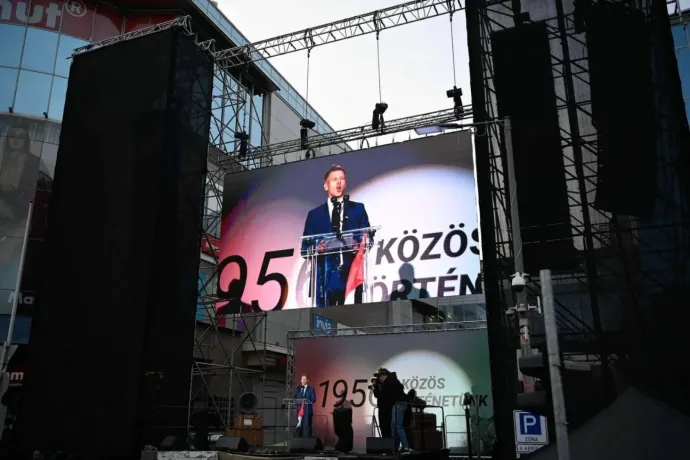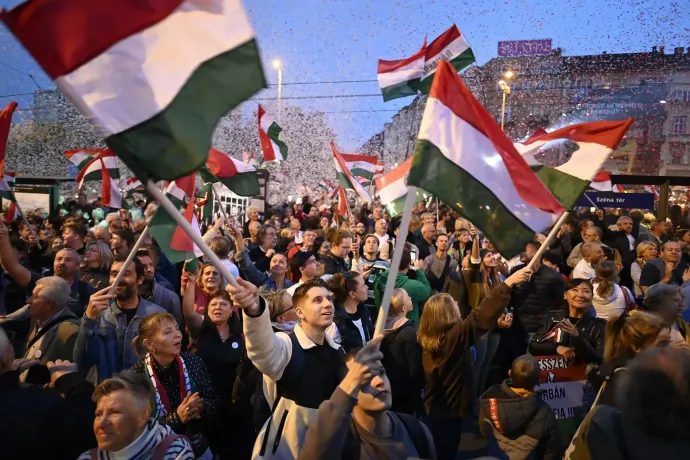Péter Magyar: What happened to “Russkies go home”, Mr. Prime Minister?

The Tisza party, which is currently Hungary's strongest opposition party, held its event commemorating the defeated 1956 Hungarian uprising against the Soviet influence at the time on Wednesday afternoon. The crowd gathered at Széna tér, the scene of one of the iconic battles of the revolution. The party's leader, Péter Magyar spoke after a brief cultural program.
"1956 is our shared history, and we can only remain faithful to Hungary if we never betray the cause for which the Hungarian fighters gave their lives," Péter Magyar said, beginning his speech. He thanked the crowd for coming, noting that this shows that the memory of the real Hungarian heroes is important to them. He said that in 1956, people were fed up after years and years of exploitation. Drawing a comparison with the present time, he added that "the Hungarian land is not for sale, it cannot be traded for any amount of money, it is sacred and untouchable, and this is something every political director and every foreign minister ought to keep in mind".
Péter Magyar said that he believes there are some in today's ruling party who would give up their country without firing so much as a single shot. "There are those who close their eyes and accept medals from the Russians while they are hacking into the Foreign Ministry's servers." Magyar said the country is now led by a person who "in 1989 demanded the withdrawal of Russian troops, but now demeans the foundations of Hungarian constitutionalism with every single one of his actions.
What happened to "Russkies go home", Mr. Prime Minister?"
– he asked.
He then went on to talk about the “hundreds of Hungarian heroes who were executed after the 1956 revolution”. Among those executed were Ilona Tóth, who worked as a doctor, 18-year-old Péter Mansfeld and János Szabó, who had fought in Széna Square (where Magyar was speaking). According to Magyar, they were the ones who were humiliated by Balázs Orbán, the Prime Minister's political director, who continues to remain in office.
"1956 is a standard, a national minimum, that is what we must get back to,"
Magyar said. We should resemble the country when it chose unity, when it said that it had had enough of oppression, and it was not afraid. "This is our collective history," he added, and said that he intends to head into the next year and a half with a similar determination (obviously referring to the next parliamentary elections, coming up in 2026).

"Even the most entrenched authority will back down if it sees that it is up against a sufficiently strong opponent," the party leader and MEP said. He then commented that although the Hungarian government has been talking about neutrality, it has no mandate to do so. St Stephen (Hungary's first king) put the country on the path of Western Christianity, the Hunyadis "defended Europe with their own lives", he said, also mentioning the revolutionaries of 1848 and the heroes of the uprising in 1956. He also pointed to the events in 1989, as well as the referendums about joining NATO and the EU as indications that Hungary has "voted to be part of the Western alliance".
According to Magyar, the government has had every opportunity in recent years to make Hungary a wonderful, happy and developing country. “Instead, they have plunged our homeland into a moral and economic crisis. While in some of our neighbouring countries, the minimum wage is twice as high as in Hungary, our VAT is the highest – all because of Orbán's failed economic policies."
Instead of adopting anti-corruption measures and bringing home thousands of billions of EU funds, the government prefers to keep the Hungarian budget on life support with Chinese loans.
He said that the Orbán government had for a long time deceived the Hungarian society, including himself. "They promised a civic and European Hungary, but they created a feudal society that has been robbed to the bone".
Preparations and promises for the elections
The freedom fighters of 1956 fought for an independent, fair and prosperous country, and we owe it to their memory to "reverse the course of our country's destiny" on the 70th anniversary of the Revolution, Magyar said, referring again to the 2026 elections.
The president of Tisza said his party was aware of their responsibility. He explained that they are working on a government programme with 65 work groups and a large number of experts so that "Hungarians would not have to vote against something", but would instead be able to vote for an attractive programme.
They will also be launching a social dialogue called "The Voice of Hungarians" from 5 November, where they will ask for people's views on the main systems and policies.
He then moved on to what they will do if they win in 2026. "We will deliver justice, we will reclaim what we can from our shared national wealth" and will bring the V4 back together. Under a Tisza government, we will not have 3 million citizens living below the poverty line. We are not going to dismantle healthcare and education, but are going to improve them," he said of their plans.
The country will join the European Public Prosecutor's Office, the "thousands of billions of EU funds" will be "brought home", they will change the law to only allow two terms as prime minister, they will do away with propaganda and will restore the independence of municipal governments.
"We have achieved a tremendous thing in recent months", and the eyes of more and more people are being opened, Magyar said. He added that they will be launching a transparent selection process for the leading politicians of the Tisza Party. They are looking for experienced professionals who excel in their area of expertise, who are willing to take on the challenges of being a public figure. They will not only select candidates for MPs, but professionals as well, with whom they will be able to smoothly take over the helm in May 2026 at the latest.
For more quick, accurate and impartial news from and about Hungary, subscribe to the Telex English newsletter!